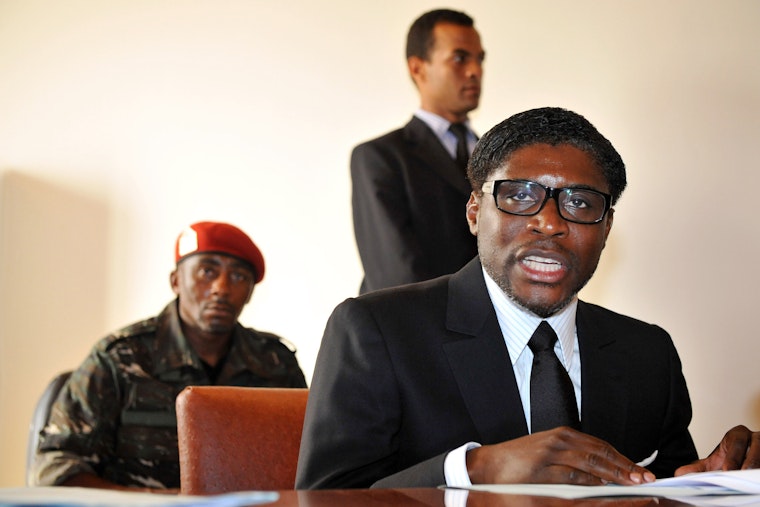Why a Trial in Paris Marks a Milestone for Anticorruption Activists
By Shirley Pouget

It took ten years to reach this point, but finally on Monday, June 19, Teodoro Nguema Obiang Mangue, vice president of Equatorial Guinea and son of the country's president, Teodoro Obiang, will face trial before a criminal court in Paris, on charges of money laundering and diversion of public funds.
Teodorin, as he is known, stands accused of using his government’s treasury as a personal bank account—diverting millions to spend on assets including a set of luxury sports cars, a 76 meter yacht, and a five-floor, 101-room mansion on Avenue Foch in Paris, one of the city’s most prestigious addresses. Meanwhile, in Equatorial Guinea itself, most of the population of some 900,000 scrapes by on a dollar a day, despite a per capita gross domestic product fueled by oil exports that is comparable to that of many industrialized nations.
Teodorin has been facing scrutiny from law enforcement officials for some time. In October, 2014, he reached a $34m settlement with the United States Department of Justice to settle similar money laundering charges over his assets in the United States, which included a villa in Malibu, California, and a collection of Michael Jackson memorabilia. He is also under criminal investigation in Switzerland.
But the trial in Paris will mark the first criminal proceeding against him in open court—something that many believed would never happen. That it did is due entirely to the dogged efforts of the French public interest law groups and nongovernmental organizations who for nearly a decade battled to push French prosecutors to launch what has become known as the biens mal acquis—or ill-gotten gains—investigation.
The biens mal acquis affair dates from 2007, when Transparency International France—represented by French attorney William Bourdon, and working closely with Association Sherpa—lodged a criminal complaint with the Paris Prosecutor against three African heads of state and members of their families (Congo-Brazzaville, Gabon, and Equatorial-Guinea) on grounds of money laundering and misappropriation of public funds. After a lengthy legal battle, Transparency International France secured recognition before the courts as a partie civile (civil party) in the case (in European continental legal systems—unlike common law systems, such as in the United Kingdom or United States—a victim of a crime acting as a civil party can play an active role in bringing a criminal complaint before a judge).
Transparency International France argued that the movable and immovable assets owned by those individuals in France could not have reasonably been acquired through salaries and legitimate benefits alone. The Paris Prosecutor’s office initially sought to block the investigation, and challenged the legal standing of the nongovernmental organization. In 2010, the Cour de Cassation (the French Supreme Court) ruled the complaint admissible, leading to the opening of a judicial investigation into the misappropriation of public funds, misuse of corporate assets, and other offences. French police issued an arrest warrant for Teodorin in 2012; the investigating magistrates finally remanded him for trial in 2016. The trial is set to take place over three weeks, from June 19 to July 6 this year at the Tribunal Correctionnel de Paris. (You can follow my account of the proceedings in English here on the Global Anticorruption Blog.)
In itself, the start of the trial is already a major victory for the global fight against grandcorruption, and for the public interest litigators and advocates whose commitment brought the case to this stage.
Never before has a sitting government official of such seniority faced criminal anticorruption proceedings in another country—for anticorruption advocates there are hopes that the trial will help establish new global standards that will create a powerful deterrent for the future. Corruption costs African states billions of dollars a year. It is considered to be a very significant part of the illicit financial flows out of developing economies, depriving populations of the resources required to eradicate poverty and fulfil human rights, and crippling the rule of law. Combatting corruption requires a range of responses—including not only action against the political leaders who are often leading beneficiaries, but also against the agents and intermediaries who facilitate the resulting money-laundering—including banks, lawyers, and real estate companies.
Ultimately, this work requires government action—including in the major financial centers around the world that reap the political and economic benefits of handling ill-gotten gains. If governments fail to act, civil society groups can seek to present prosecutors with evidence that they cannot ignore. But enormous difficulties remain. Prosecutors are often reluctant to open judicial or prosecutorial investigations against senior public officials. When they do, it takes years of work to trace and intercept the looted money—frequently hidden behind opaque shell corporations or dispersed into offshore accounts covered by bank secrecy laws. Witnesses are often unwilling to testify against their national rulers out of fear of reprisals. Even in civil law countries, where private parties are allowed to initiate criminal actions, nongovernmental organizations face a wide array of legal impediments (such as standing, jurisdiction, and forum-related issues) to bringing legal action on behalf of victims of grand corruption.
Not surprisingly, many of the highest profile corruption cases directed at political leaders have involved those no longer in power—such as seizures by Switzerland, the United States, and other countries of over $1 billion dollars of assets stolen by Nigeria’s former president Sani Abacha, or Switzerland’s action to seize $650 million of assets held by former Egyptian president Hosni Mubarak.
But the opening of the Obiang trial shows what can be done to target those still in power. It also provides a prime example of how strategic litigation driven by civil society groups, alongside advocacy and campaigning, can be powerful tools against senior officials looting the wealth of their countries.
Until March 2020, Shirley Pouget was an advocacy officer with the Open Society Justice Initiative.